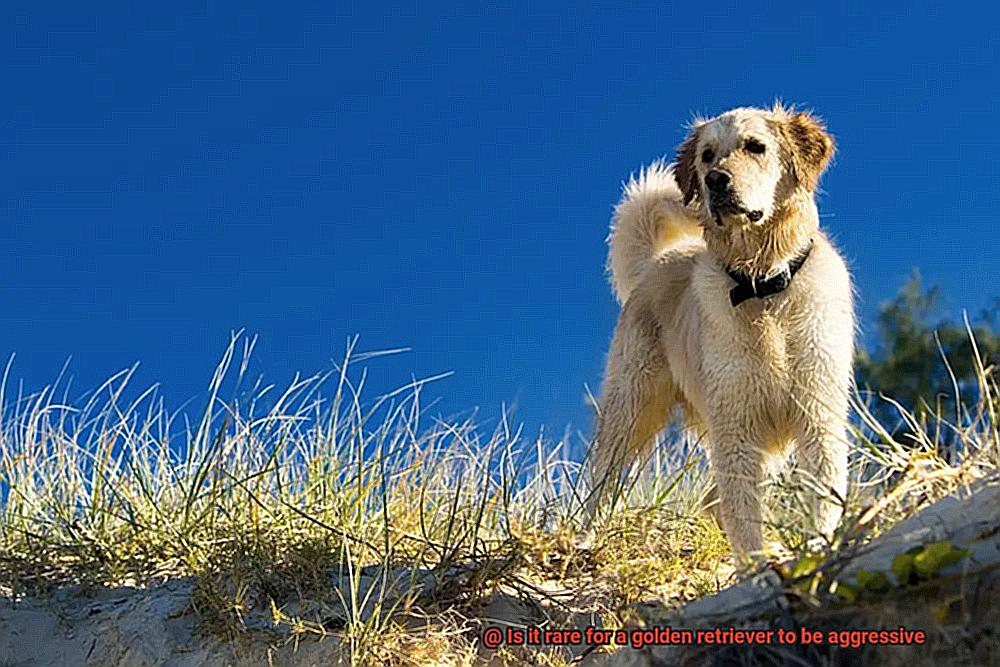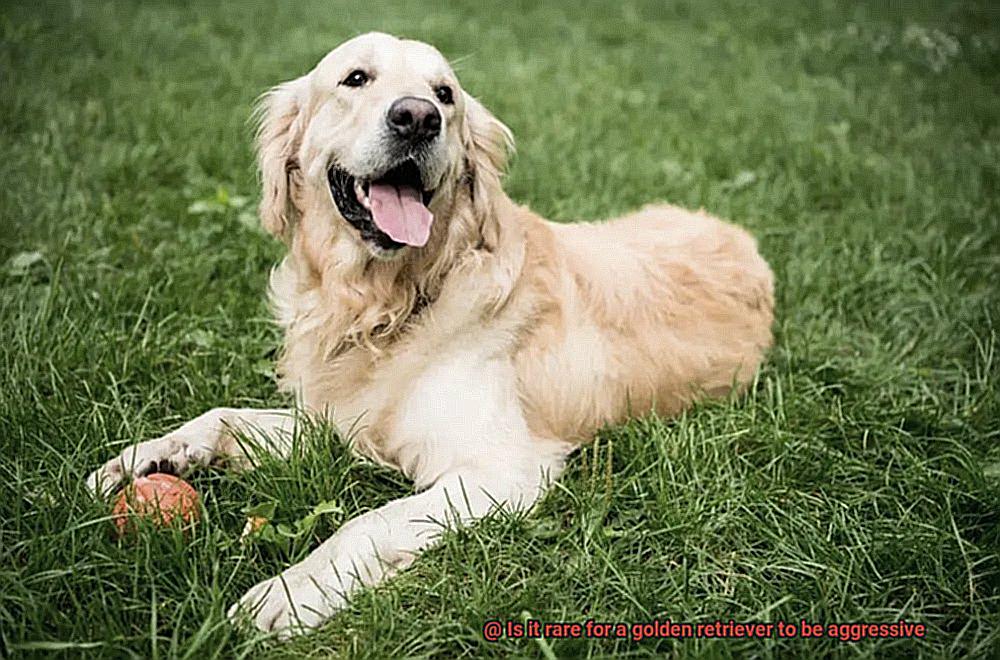Golden Retrievers are undoubtedly one of the most popular dog breeds around. With their friendly demeanor, loyalty, and eagerness to please their owners, it’s no wonder why they’re so beloved. However, even the sweetest of dogs can display aggressive behavior from time to time. So, is it rare for a Golden Retriever to be aggressive?
If you’re considering getting a Golden Retriever, chances are you’ve heard many stories about their gentle nature. But like any other breed, there are always exceptions to the rule. It’s essential to understand what might trigger aggression in these dogs.
Several factors could contribute to aggressive behavior in Golden Retrievers, including genetics, socialization, and training. Understanding your dog’s history is crucial before bringing them into your home.
In this blog post, we’ll explore the potential causes of aggression in Golden Retrievers and whether it’s uncommon for them to exhibit such behavior. We’ll delve into the underlying reasons behind their aggressive tendencies and provide insights on how you can prevent it. Whether you’re already a proud owner of a Golden Retriever or just a dog lover curious about this topic – keep reading. We’ve got some fascinating insights to share with you.
Overview of Golden Retrievers
Contents
Golden Retrievers are a beloved and popular dog breed, and it’s no wonder why. These friendly and gentle pups make excellent family pets. They are highly trainable and intelligent, making them perfect for various roles like therapy dogs, hunting companions, and search and rescue dogs.
With their muscular body and broad head, Golden Retrievers have a medium-sized build that exudes strength and grace. Their thick water-repellent coat comes in various shades of gold, requiring regular grooming to maintain its lustrous shine. With a life expectancy of 10-12 years and weighing between 55-75 pounds, Golden Retrievers need regular exercise to maintain their health and happiness.

Originating in Scotland in the mid-19th century, Golden Retrievers were bred for hunting purposes. Specifically, they were trained to retrieve game birds from water or land. Today, they are renowned for their gentle nature, making them unlikely to display aggression towards humans or other animals.
However, like any dog breed, Golden Retrievers require proper socialization and training to prevent potential behavioral issues. While aggression is not common in this breed, it can manifest due to genetics, training, or environmental factors. Territorial aggression, fear-based aggression, and possessive aggression are all possible forms of aggressive behavior that can develop if not addressed appropriately.
As responsible pet owners, it is crucial to provide your Golden Retriever with the proper training and socialization they need to thrive. If you notice any signs of aggression or problematic behavior in your pup, seek help from a professional dog trainer or behaviorist.
Causes of Aggression in Golden Retrievers
Golden Retrievers are known for their gentle and friendly nature, but as with any breed, there are times when aggression may rear its head. As an expert on the topic, I have compiled some research notes to help you understand the causes of aggression in Golden Retrievers.
Fear is one of the most common causes of aggression in Golden Retrievers. If your furry friend feels threatened or scared, they may resort to aggressive behavior as a means of self-defense. This can happen if your dog is in an unfamiliar environment or encounters a new person or animal. It’s important to be aware of your dog’s body language and know when they are feeling uncomfortable or scared. By identifying these triggers, you can help prevent aggression before it happens.

Another cause of aggression in Golden Retrievers is dominance. Dogs are pack animals and have a natural instinct to establish a hierarchy within their pack. If your Golden Retriever feels that it is not being respected or is being challenged, they may become aggressive to assert their dominance. However, this behavior can be prevented by establishing yourself as the pack leader through proper training. With consistency and patience, you can teach your furry friend appropriate behavior and reinforce your position as their leader.
Medical issues can also be a cause of aggression in Golden Retrievers. Pain, illness, or injury can cause a normally calm and gentle dog to become irritable and aggressive. Therefore, regular check-ups with a veterinarian are essential to detect any underlying medical problems that may cause aggression.
Lastly, improper socialization and training can also contribute to aggressive behavior in Golden Retrievers. If a dog has not been socialized with other dogs, animals, and people from an early age, they may develop fear and anxiety towards them. Additionally, if a dog has not been trained properly, they may not understand appropriate behavior and may resort to aggression. It’s crucial to socialize your furry friend from an early age and provide consistent training to ensure they understand appropriate behavior.

Signs of Aggression in Golden Retrievers
Golden Retrievers are known for their friendly and calm nature, but like any other breed, they can show signs of aggression if they feel threatened or uncomfortable.
The first sign of aggression that you should look out for is growling. It’s a warning sign that your dog is feeling uncomfortable or stressed. If you hear your Golden Retriever growling, it’s crucial to address the situation immediately and remove your dog from the source of discomfort. Remember, growling is your dog’s way of telling you he’s unhappy with the situation.
Another sign of aggression in Golden Retrievers is snapping or biting. This can happen if your dog feels cornered or threatened. To prevent this behavior, avoid putting your dog in situations that make them uncomfortable and train them to respond appropriately to stressful situations. Positive reinforcement training can help your dog learn to cope with such situations.
Excessive barking, lunging, and showing teeth are also signs of aggression in Golden Retrievers. These behaviors can indicate that your dog is feeling anxious or defensive. It’s important to identify what triggers these reactions and address them accordingly.
In some cases, aggression in Golden Retrievers can be caused by medical issues such as pain or illness. If you notice sudden changes in behavior, take them to the vet for a check-up. Your veterinarian will be able to rule out any underlying medical issues that may be causing the aggressive behavior.
To prevent aggression in Golden Retrievers, provide proper training and socialization from a young age. This will help them feel comfortable around people and other animals. Additionally, ensuring that they receive enough exercise and mental stimulation can also help prevent aggressive behavior.
Preventing Aggressive Behavior in Golden Retrievers

y taking some preventative measures, you can ensure that your furry friend remains well-behaved and happy.
The first step in preventing aggression is to properly train your dog. Begin training them at a young age, teaching them basic commands like sit, stay, come, and heel. Positive reinforcement techniques like tasty treats and heaps of praise can encourage good behavior.
Socialization is just as important as training. Introduce your golden retriever to different people, animals, and environments from an early age so they can become comfortable with new experiences and learn how to behave appropriately.
It’s also essential to monitor your dog’s behavior and intervene if necessary. If you notice any signs of aggression like growling or biting, address the issue immediately. Ignoring or tolerating aggressive behavior can lead to more severe problems down the line.
Another helpful measure is to provide your golden retriever with plenty of exercise and mental stimulation. A tired and stimulated dog is less likely to display destructive or aggressive behaviors. Take them for daily walks or runs, play games that require mental stimulation, and give them toys that keep them entertained.
Professional Help for Aggressive Golden Retrievers
While this breed is known for their friendly and gentle nature, some may exhibit concerning and challenging behaviors like growling or biting. If you notice any of these behaviors, seeking professional help from a qualified dog behaviorist or trainer is the best course of action.
Although some owners may attempt to address the issue on their own, consulting with a professional can provide valuable insights and techniques to help manage and reduce aggressive behaviors. For instance, Certified Applied Animal Behaviorists (CAABs) are professionals with specialized training in animal behavior who can conduct a thorough evaluation of your dog’s behavior and create a personalized treatment plan based on their findings.
Similarly, Certified Professional Dog Trainers (CPDTs) have completed extensive coursework and testing to earn their certification and can provide guidance on basic obedience training as well as addressing specific behavior issues. However, it’s crucial to research and choose a professional who has experience working with golden retrievers specifically and has a positive, science-based approach to training and behavior modification.
Apart from seeking professional help, creating a safe environment for yourself, your dog, and others is also essential. This could include using a muzzle when in public or keeping your dog separated from young children or other pets. Remember that not all trainers or behaviorists are created equal, so take time to find the right one who can help you tackle the issue.
Conclusion
To wrap things up, while Golden Retrievers are typically known for their kind and gentle temperament, it’s important to recognize that any breed can display aggression. Factors such as fear, dominance, medical issues and poor socialization or training can all contribute to aggressive behavior in Golden Retrievers.
As responsible pet owners, it’s crucial to provide your furry companion with proper socialization and training from the get-go. This can help prevent potential behavioral problems down the line. It’s also essential to keep a close eye on your dog’s behavior and intervene if you notice any concerning signs of aggression such as growling or biting.
To help prevent aggressive behavior in Golden Retrievers, providing ample exercise and mental stimulation is key. This can help keep your furry friend happy, healthy and well-behaved.
If you do notice any problematic behaviors in your Golden Retriever, seeking professional help from a qualified dog trainer or behaviorist is always the best course of action. With patience, consistency and love, you can ensure that your furry friend remains a friendly and well-mannered member of your family.
In summary, while it’s not common for Golden Retrievers to exhibit aggression when properly trained and socialized from an early age, understanding the potential causes of aggressive behavior is important for preventing issues down the line.









